October 16, 2006
Internet Gambling
The 1960's "Wire Act" was outlawed wagers placed over the telephone. It was meant to reduce illegal bookmaking operations which were and remain integral to organized crime. Now more legislation is coming through, precedented by the Wire Act, to criminalize placing wagers on the internet.
I just received a notification from FirePay, an online fund transferring company, that they will no longer service transfer of funds to/from online gambling accounts. This is a node of interest for my personal interaction with internet gambling and the laws about it in the U.S..
Previously I, and millions of others, interacted with gambling sites with almost complete autonomy, unaware and certainly unbothered by any legislature/enforcement thereof. I didn't really care whether or not transferring funds from my U.S. based FirePay account to off-shore poker servers was technically legal because all the businesses I was dealing with (my bank, FirePay, and Paradise Poker) were all legitimate corporations.
Now it seems as if the enforcement foot has come down, or is coming down anyway. The "Unlawful Internet Gambling Enforcement Act" is upon us.
Major credit card companies ceased accepting direct transfer of funds from online gambling accounts a couple of years ago (although most, from what I can tell, continued allowing purchases of chips at these sites). Now the powers that be have started breaking down any other form of fund transfers to these sites (Bush's name has been directly associated with all of this, including a reference as such in the email I got from FirePay).
It appears as if this new legislation is going to have a major impact on internet gambling within the United States.
P.S. (1/08/2007) - I've been reading up a bit on this topic. It seems that the passing of this law was spearheaded by conservatives in political asperation. Obviously the poker community is outraged, especailly because internet poker is not specified in the bill. Actually, the language regarding what exactly constitutes "Unlawful Internet Gambling" is non-existent. So, despite the fact that U.S. based financial institutions and the majority of offshore poker sites are declining business to U.S. internet gamblers, the law is open for interpretation and the poker community is rallying to do some battle. Good luck.
September 17, 2006
Speak!
Anxious of No; yearning for Yes.
Signal-crossed trap; means with no ends,
Speak once, fool!
So what of Just and Friends?

Next to nothing is nothing, I guess.
Speak!
P.T. Roll
September 14, 2006
Don't Let the Disease Bring Us Down
The world is gone, no need to hurry.
The road is long, don't think about it.
Because life is short, we'll do without it.
We'll do without it somehow.

MUTE MATH, Philadelphia November 4, 2006
July 11, 2006
Reading Review
 The Professor, the Banker, and the Suicide King, Michael Craig, nonfiction. The tagline for this book appearing under the title on the cover is "Inside the Biggest Poker Game of All Time." Craig's text is easy to read, without suffering from the downright childishness that plagues some other poker non-fiction. The story he unfolds is unavoidably compelling, even for anyone who doesn't know who Howard Lederer, Andy Beal or Ted Forrest is.
The Professor, the Banker, and the Suicide King, Michael Craig, nonfiction. The tagline for this book appearing under the title on the cover is "Inside the Biggest Poker Game of All Time." Craig's text is easy to read, without suffering from the downright childishness that plagues some other poker non-fiction. The story he unfolds is unavoidably compelling, even for anyone who doesn't know who Howard Lederer, Andy Beal or Ted Forrest is.What the book does most successfully, even beyond its incisive and accurate accounts of the fabled "Big Game," is to portray the nature of these larger-than-life individuals who willingly and literally risk millions on the turn of a card every day. The glitter and pomp of Texas banker Andy Beal's challenge to the top professional poker players for nearly every dollar they could scrape together is not only an interesting poker tale, but a curious depiction of our shared humanity. The need to gamble is a mutated over-grown aspect of that which afflicts these great players. Only the most talented can overcome their addiction by finding a way to channel it into success. Terrifying and thrilling.
 The Gambler, Fyodor Dostoyevsky, novel. I saw a cartoon once, I think it was a FarSide. It showed a man reading on the beach being confronted by an officer, "Sir, Dostoyevsky is not appropriate summer reading." Book police. Talk about delving into the depths of humanity. I have never previously read any Dostoyevsky (D.), I managed to dodge Brothers Karamozov in high school and didn't take a second glance. It was only after reading references to his work in two of the great poker non-fictions (Alvarez's Biggest Game in Town and McManus' Positively Fifth Street - both of which I've re-read also this summer) that my interest was piqued. The line quoted by McManus appears near the end of the novel, and is roughly, "The mere sound of chips nearly sends me into convulsions," spoken reflectively by the story's anti-hero Alexis Ivanovich, a void college graduate with dubious employment history, relying on gambling to meet his needs (um....).
The Gambler, Fyodor Dostoyevsky, novel. I saw a cartoon once, I think it was a FarSide. It showed a man reading on the beach being confronted by an officer, "Sir, Dostoyevsky is not appropriate summer reading." Book police. Talk about delving into the depths of humanity. I have never previously read any Dostoyevsky (D.), I managed to dodge Brothers Karamozov in high school and didn't take a second glance. It was only after reading references to his work in two of the great poker non-fictions (Alvarez's Biggest Game in Town and McManus' Positively Fifth Street - both of which I've re-read also this summer) that my interest was piqued. The line quoted by McManus appears near the end of the novel, and is roughly, "The mere sound of chips nearly sends me into convulsions," spoken reflectively by the story's anti-hero Alexis Ivanovich, a void college graduate with dubious employment history, relying on gambling to meet his needs (um....).He theorizes, "Russians are too richly and mutifariously endowed to be able to find a decent form for themselves very quickly. It's a matter of form. For the most part, we Russians are so richly endowed that it takes genius for us to find a decent form. Well, but most often there is no genius." Needless to say, I associated deeply with the D.'s thoughts spoken through Ivanovich. Again (as I am told is common to D.) the ending is dark and cryptic (sort of like death, no?). You know you're back to good literature when there is no distinct ending and it's at least implied that the main character dies painfully. Good book, definitely not appropriate summer reading.
 One of a Kind, Nolan Dalla and Peter Alston, nonfiction. "The rise and fall of Stuey 'The Kid' Ungar, the world's greatest poker player." I found this book to be excellent. It may not be as literary as Dostoyevsky, or even Alvarez for that matter, but the story that it tells is rich with meaning. Stu Ungar isn't in Rounders and you won't hear a lot about him on ESPN commentary, but the often unspoken fact is that he won the main event at the World Series of Poker an unprecedented three times. While he was alive he was undisputed as the world's best gin player. His mind was truly...well, the title of the book pretty much gets it. Like the players depicted in Professor, Banker, Suicide King, Stuey had the gift/curse. His life was amazing, tortured, blessed, enviable, and pitiful. He epitomizes the great tensions that strain humanity: glimpses of pure greatness at odds with the chains of compulsion and addiction. Although the text does not portray him as the most personable guy, I would like to have met Stu.
One of a Kind, Nolan Dalla and Peter Alston, nonfiction. "The rise and fall of Stuey 'The Kid' Ungar, the world's greatest poker player." I found this book to be excellent. It may not be as literary as Dostoyevsky, or even Alvarez for that matter, but the story that it tells is rich with meaning. Stu Ungar isn't in Rounders and you won't hear a lot about him on ESPN commentary, but the often unspoken fact is that he won the main event at the World Series of Poker an unprecedented three times. While he was alive he was undisputed as the world's best gin player. His mind was truly...well, the title of the book pretty much gets it. Like the players depicted in Professor, Banker, Suicide King, Stuey had the gift/curse. His life was amazing, tortured, blessed, enviable, and pitiful. He epitomizes the great tensions that strain humanity: glimpses of pure greatness at odds with the chains of compulsion and addiction. Although the text does not portray him as the most personable guy, I would like to have met Stu.Those are the three I've read already. I started Ayn Rand's The Fountainhead, but it's like a bujillion pages long and I'm beginning to second guess the decision to buy the $8.95 verion with teeny-tiny print crammed into small pages over the $20 one with good production value. Maybe I can check out a readable version from the library and leave my copy on the intellectual trophy case (aka bookshelf).
9.17 Update
 Sophie's World, Jostein Gaarder. This self described "novel about the history of philosophy," was basically an intro philosophy textbook thinly disguised by a fairly disposable plot. Nonetheless, I did enjoy refurbishing my limited knowledge of said philosophical history. The story was vague and peripheral for over half the book, but it did take an interesting turn. However, I thought the plot disintegrated at the conclusion. Tricky to recommend for anyone other than intro philosopy types, probably hard to plough through all the textbooky stuff if philosophy isn't your thing.
Sophie's World, Jostein Gaarder. This self described "novel about the history of philosophy," was basically an intro philosophy textbook thinly disguised by a fairly disposable plot. Nonetheless, I did enjoy refurbishing my limited knowledge of said philosophical history. The story was vague and peripheral for over half the book, but it did take an interesting turn. However, I thought the plot disintegrated at the conclusion. Tricky to recommend for anyone other than intro philosopy types, probably hard to plough through all the textbooky stuff if philosophy isn't your thing.On Art and Life, John Ruskin. A pamphlet actually, from Penguin Press's "Great Ideas" series which include other pamplets by the likes of Machiavelli, Payne, Nietzche, Darwin, etc.. Ruskin was actually referenced briefly in the previous Gaarder text, which I thought was interesting, considering I acquired both books at random. Anyway, this is one of those looks smart on the coffee table kind of books, a real pain to actually read. But when I finally did get around to forcing the old-timey english down I found remarkable relevance in Ruskin's ideas about division of labour and originality and creativity in the workforce. He calls for a "humanizing" of the worker, have the worker think and the thinker work. Now if I could just get a job.
"You must either make a tool of the creature, or a man of him. You cannot make both."
Back to the Island
All of the crap that clutters our lives (for me it was poker, academic b.s., job search, etc.) causes us to forget. What I forgot is that life is good. It took a long overdue return to Peaks to remind me of that fact. No matter how much manufactured, contrived, structured garbage was cluttering my thoughts, one whiff of cool sea air, one glimpse of ancient rocky shores and stark evergreen treelines was more than enough medicine to overcome the pathetic woes of post-college existence. I forgot about fishing! Swimming! Hell, mowing the overgrown meadow at the foot of the hill! Despite the wealth of things that contribute to the Peaks' allure, the best part is the people. Sure, it's getting more crowded as more people leak the secret (you didn't hear about Peaks from me). The houses change, the stores and restaurants change, but in my lifetime a special community has remained in tact. That constancy is uplifting, but the idea is better.
There are places in this world where peace and harmony abound. Perhaps the answer is not to seclude ourselves there, but to emanate even a faint reflection of the island-lifestyle everywhere we go and with everyone we meet. But I hate making new year's resolutions, so I won't do it now. But still, maybe...
My uncle Phil and me "fishing" (aka casting in vain). We caught only two striped bass over the whole week, neither was a keeper.

The float in Spar Cove has been a yearly tradition for about 6 or 7 years now. This year's version is an improvement to previous incarnations, the water is still pretty cold.

June 01, 2006
Late Night at McCoy’s (and Nothing to Show)
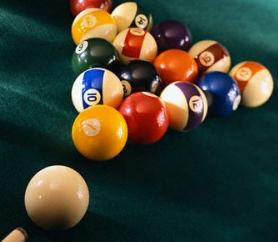 Angle Shooter n.: A player attempting to win extra money with tactics of dubious legitimacy. (Defined in glossary of Positively Fifth Street by Jim McManus).
Angle Shooter n.: A player attempting to win extra money with tactics of dubious legitimacy. (Defined in glossary of Positively Fifth Street by Jim McManus).I drove up to Pennsylvania last night to play in free pool tournament ($50 gift-card for winner) at what turned out to be a real seedy bar called McCoy’s. The three pool tables were located in the basement, which, as the night wore on, became more and more populated with persons of unsavory character. Myself included? Not this time. It kind of reminded me of the scene described in the Little Feat song "Spanish Moon" about a dive establishment.
Ever hear the phrase "flat beer out of rusty pipes"? I don’t know if the pipes were actually rusty, but the Coors Light on tap was so flat that I actually started buying bottles by the end of the night. This was especially tough b/c it was $1 drafts – but I figure even $1 for beer you can’t drink is still a bad deal. I signed up for the pool tourney at around 10:15 (it was supposed to have already started). I shot a few warm-up games and was feeling pretty good about my 8-Ball skills for the evening.
Finally, at after 11:30, the tourney got underway. I had to wait for my first round match (best of three games) because there weren’t enough tables to simultaneously accommodate the 15 or so people who signed up. When I eventually got to play it was against a younger guy named Brandon. I’m going to extricate any racial identifying for this post, but I will say this – I played people of varying skin tones, and by the end of the night an overall sense of misanthropy was reinforced in lieu of any racial stereotype reification. I tried to start the game off friendly and classy by ceding the first break. We then (in typical disjointed poolroom conversation) tried to work out the basic ground rules (call your shots, open table after break, etc.). The first time that Brandon slopped in an unintentional shot and continued shooting I said, "Ok, well, next time call that if that’s how you want it to go in." It happened at least two more times, I never protested much more than a slightly sarcastic, "Yeah, yeah, whatever" kind of thing. He was also doing stuff like palming the ball that the cue was near so he wouldn’t move it, standing near the rail in my line of sight for every shot I took, and giving me the, "You sure that’s where you want it?" kind of crap on eight-ball shots. I beat him soundly two games straight. Next!
Side Note: It seems to me that people who invest so much attention on finding little b.s. ways to get an "edge" often lack the requisite fundamental skills in the game they are playing. This has historically been true for card cheats – why should pool be any different? South-side-shark angle shooting is lowbrow, classless, and pretty laughable. Get some game and play straight-up like a man (not a macho thing, I suppose it could be "like a decent person," but that kind of breaks the flow).
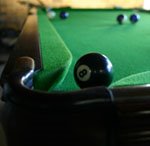 My next game was with a 26 year-old named Alex. I had watched him play his first match an heard him talking a pretty good game, so I anticipated a challenge. He won the lag for the first break, but I took control of the table right away, pocketing a bunch of "trouble" balls and leaving myself a good looking situation. Sure enough, I was able to bank the 8 into the corner pocket on my third turn at the table. About halfway through our secondd game we both agreed that the 8 had to be banked in (by handshake, he was big on the handshake – I probably shook the guys hand 20 times last night). It actually saved me, he was the first to it and made a mistake by accidentally putting it straight into a pocket. "Cool," I thought to myself, I just won my second match. Not exactly. Alex starts in about, "I saved you on that game," honor-this, blibbety-bloobety that. Ok, buddy, get more quarters from the guy running the show and I’ll play you again. At this point the people who I knew there had all left, and I was in no mood to get my ass beaten over a free-roll pool tourney. The last game was close, and it was looking grim when he pocketed his second-to-last ball leaving only the seven-ball hanging near on the edge of a pocket (no bank-the-8 rule this time). But wait, the cue trickled behind one of my stripes and it looked like I would get a chance to finish the game myself. Strangely, lining up what I thought was a bank-shot attempt, he pocketed the 8-ball in the side pocket! No question mark on that game, I had now beaten him three games in a row.
My next game was with a 26 year-old named Alex. I had watched him play his first match an heard him talking a pretty good game, so I anticipated a challenge. He won the lag for the first break, but I took control of the table right away, pocketing a bunch of "trouble" balls and leaving myself a good looking situation. Sure enough, I was able to bank the 8 into the corner pocket on my third turn at the table. About halfway through our secondd game we both agreed that the 8 had to be banked in (by handshake, he was big on the handshake – I probably shook the guys hand 20 times last night). It actually saved me, he was the first to it and made a mistake by accidentally putting it straight into a pocket. "Cool," I thought to myself, I just won my second match. Not exactly. Alex starts in about, "I saved you on that game," honor-this, blibbety-bloobety that. Ok, buddy, get more quarters from the guy running the show and I’ll play you again. At this point the people who I knew there had all left, and I was in no mood to get my ass beaten over a free-roll pool tourney. The last game was close, and it was looking grim when he pocketed his second-to-last ball leaving only the seven-ball hanging near on the edge of a pocket (no bank-the-8 rule this time). But wait, the cue trickled behind one of my stripes and it looked like I would get a chance to finish the game myself. Strangely, lining up what I thought was a bank-shot attempt, he pocketed the 8-ball in the side pocket! No question mark on that game, I had now beaten him three games in a row.The only problem is that when reported the win to the tournament "director" a little while later he told me that Alex said he had won. In the meantime he had been buying me beers and treated to a side-game of nine ball while I (I guess he thought he) was waiting. I won that game, too, by the way. I explained what had happened, and I got to play again, this time against a girl named Squeak. I botched the first game after running a bunch of balls and scratching on the 8-ball (my favorite way to win and least favorite way to lose). I actually wasn’t worried, she didn’t seem to be very good at all. I racked up the second game while wondering how she won two previous matches. I was shooting real well still and worked my way to a pretty easy shot on the 8-ball with maybe 5 of her solids still on the table. The catch: on my previous shot I pocketed my called shot, while knocking in a solid after the cue ball had struck my ball. This is not unusual, and had actually happened at least once already in the previous game. Now she indicates that she thinks it’s her shot because I hit one of her balls in. Here we go again. This time I didn’t hesitate to object, and decided that the best thing to do was just say, "I don’t think so" and hit the 8. I had no problem winning the next game and was now in the finals – sweeet.
Alex was still around and still bitching about how he beat me and I was lying (uh-oh, once the "liar" talk comes out it’s time to think about rolling). It didn’t matter much anyway, because at this point it was after 2:00am, and I was told that "no one won." I was pretty mad (it seemed like everyone there was trying their hardest to screw me over) but I reminded myself yet again that there was very little at stake and decided to walk.
Cest la Vie. Live and learn.
May 31, 2006
Four Nines at the Tropicana
Side Note: No more than two minutes out of my driveway I was almost killed by a careening old lady who opted to disregard the red light at the intersection which I was in the process of turning left across. The headlines flashed before my eyes, "Recent Graduate Killed by Old Person on Way to Doctor's Office." Funny concept for a South Park episode, not as funny when you're actually staring down a little tuft of white hair above the steering wheel coming right for you at 50 mph.
 The next Saturday was the University of Delaware graduation. I was able to skip the ceremonies while cashing in on a couple of graduation parties (all the free booze, none of the work!). What better location is there for a little after-party graduation celebrating than...that's right: ATLANTIC CITY. About seven of us piled into two cars and hit the Atlantic City Expressway at about 9:00pm on Saturday night. I had been to AC once before (Spring Break, Sophomore year - very not 21) but that was in the middle of March. The whole town was hopping, and it was my first [legal] venture into the big casino town. We hit the Tropicana and ended up staying there the whole night (well, there were a few side excursions to...um...Hooters, yeah, that's it).
The next Saturday was the University of Delaware graduation. I was able to skip the ceremonies while cashing in on a couple of graduation parties (all the free booze, none of the work!). What better location is there for a little after-party graduation celebrating than...that's right: ATLANTIC CITY. About seven of us piled into two cars and hit the Atlantic City Expressway at about 9:00pm on Saturday night. I had been to AC once before (Spring Break, Sophomore year - very not 21) but that was in the middle of March. The whole town was hopping, and it was my first [legal] venture into the big casino town. We hit the Tropicana and ended up staying there the whole night (well, there were a few side excursions to...um...Hooters, yeah, that's it).I played poker the whole time, about seven hours straight. The room was enormous, probably 50 tables at least, and I was able to get a seat at a $4/$8 game without any wait. The game was delicious, very passive, a lot of really easy players, and I was doing well for the first couple of hours. At one point I had juiced my $120 buy-in to over $250. I could say that the following hours of reversal were a result of all that free alchohol (that's what I'm talking about AC), but that, in all it's Hemmingwayesque romanticism, would simply not be true. The fact of the matter was that I simply stopped getting dealt cards. Even if I did play a hand for a flop, I was mucking before showdown. I went for over two hours straight without winning a single p
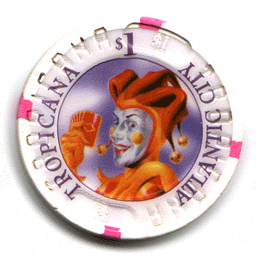 ot, and my $130 profit had dipped to as low as a $50 deficit at one point. By the time everyone else was ready to go I had built my chips back up to only -$20, so I wasn't too adamant about staying at the table.
ot, and my $130 profit had dipped to as low as a $50 deficit at one point. By the time everyone else was ready to go I had built my chips back up to only -$20, so I wasn't too adamant about staying at the table.Interestingly enough, the hand that broke my two-hour losing streak was doozy. I was in the small-blind and someone had already raised the pot with one caller. I checked my cards and saw two black nines (the hand Hellmuth won with in '89). I just called, as did the big-blind. I caught a glimpse of a nine peeling off when the dealer was mid-flop, and was more than a little surprised to see a second nine hit the board as well. I checked, the big blind bet, and the pre-flop raiser raised. The guy between then cold-called the raise! And here is where I made my big mistake: I just called instead of reraising. Whenever people flop a fire-breathing monster like that they feel compelled to "slow-play" it (not much concern about someone catching up in the hand). But in this situation (unless someone had JJ in the hole) I had the board locked up - no one else could have had a nine, and with so many callers even a hand like AA or KK would be likely to only check-call the rest of the way. Of course, this is what happened, although no one even called me all the way to the river (yeah, there were some pretty bad players). The fact that no one called me all the way also gave me the opportunity to casually toss the four nines into the muck without a word - something which takes an inordinate amount of self-control, I will add.
I guess the easiest way to play quads on the flop is when someone else moves all-in in front of you (QT) Q77 vs. (77) and all you have to do is say, "Yeah, I'm gonna go ahead and call you."
May 17, 2006
When It's Over
The rug is officially pulled and I'm open to suggestions.
P.S. - I have yet to indulge "School's Out" (forever) by Alice Cooper. I'm too scared to listen to it.

May 13, 2006
Chimes Spoof Causes Pre-Fab Campus Stir
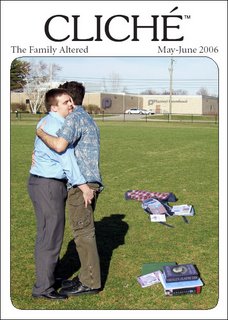 For anyone who is unacquainted with the customs of Calvin College, allow me to give a bit of background. Periodically (every two years or so) the on-campus student-run newspaper "Chimes" produces a spoof publication. As many Calvin students are aware, these spoofs include The Bananer (ala CRC's Banner), Calvin for Dummies, and recently Shirley Hoogstra's Living (ala Martha Stewart's magazine - Shirley Hoogstra is the dean of resident life).
For anyone who is unacquainted with the customs of Calvin College, allow me to give a bit of background. Periodically (every two years or so) the on-campus student-run newspaper "Chimes" produces a spoof publication. As many Calvin students are aware, these spoofs include The Bananer (ala CRC's Banner), Calvin for Dummies, and recently Shirley Hoogstra's Living (ala Martha Stewart's magazine - Shirley Hoogstra is the dean of resident life).For all of these publications a large portion (I believe) of their overall value or cleverness is in the way they accurately reproduce the mode of publication which they are spoofing. Calvin for Dummies was bound and looked just like the Blank for Dummies books everyone recognizes. The Martha Stewart spoof was printed on magazine-glossy, you get the picture. Content - eh, whatever. As with so many other examples, I perceived the Chimes spoof to be mostly about IMAGE over CONTENT. Another meaningless pop-artifact toilessly produced by meaningless pop-people.
This year's target was another objectified icon of CRC-ness: the TODAY devotional booklet (my family read from it every night after dinner). Yet again, the joke of parodying the visually recognizable elements was a clever/amusing success. The only problem is they pushed too hard on infusing the content with actual satire. Needless to say, this created a big stir with the higher-ups (they don'd need to be forking over cash for a bunch of snotty irreverant little Chimes weasels to publish their big prank on the traditions from which they arose). When push came to shove, Shirley Hoogstra (still reeling from the personal jab of the last Chimes spoof) and her crack-squad of Spoof Reviewers put the kibosh on the whole project.
Here's the real story, though. This "clash" of students versus administration was ripe for some sort of over heralded, loudly proclaimed, hugely advertised student uprising (read: quasi-interested grumbling). Naturally, the only on-campus student-run publication made a big stink in the past few issues (Chimes has always been notably inwardly directed in its content), and I fear that some people may mistake this episode for something containing actual substance!
IT'S ALL PART OF THE GAME. The Man cracks down and the students rise up. Blah blah blah. In my time spent at Calvin I've monitored the texture of student life and it is abundantly clear the we are a sedated, under-motivated, self-involved bunch. There is no such thing as revolution, especially one coming from the battlefield of Calvin College. The show must go on, so why kid ourselves into thinking that the role we play is anything but just that - a role in the show.
P.S. - The cover image of the CLICHE booklet is linked to its online publication at www.calvinspoof.com. I have perused a few of the daily entries and find some of them amusing. That being said, I do recognize how offensive it can be to assault something which is adhered to religiously by large group of people (just ask fatwah survivor Salmon Rushdie). To invoke Harry Truman, "If you can't stand the heat, get out of the kitchen." Please don't read it if it makes you upset, it's just a thing produced by some smuglies at Calvin College. However, I think it's important to remember the words of Professor Crump, who cautions that the real threat to healthy Christian life may not be satire, but rather packaged doses of daily "Chicken Noodle Soup" which permit people to sever contact with actual study of the Scripture.
May 03, 2006
Pub Post
 One Trick Pony
One Trick Pony
Located just around the corner (touching) from The Cottage on Fulton Street, One Trick Pony is a decent spot. It's really more of a restaurant than a bar, but they do have live music and a "Guinness-y" kind of feel going on. My main problem with One Trick is that it's too refined/uppety to really hang out there (in linear relation, drink prices were also a bit uppety).
Elbow Room
On the northern side of town, Elbow Room is past Logans Alley just off of Lake Michigan. I'd say it's worth the extra drive; the atmosphere is vibrant and friendly, but in a down-home kind of way. Drinks are cheap as well- definitely a Jameson/Labbatt kind of joint.
Nite Cap
On the West Side of Fulton Street, Nite Cap would not have been a draw but for the fact that one of the bartenders is a friend (read: really cheap drinks). Nite Cap tends to suffer from "westside syndrome" a bit: mopey blue collar types. However, with the jukebox pumping out some Little Feat and a baseball game on the tube the atmosphere lightens a bit.
Kuzzins Lounge 
Another West Side bar, Kuzzins is near the thick of things on Leonard Street - the main drag on the west side. Despite the unique lounge look (moulded recessed ceilings, leather booths, dance floor, ambient lighting), Kuzzins seems to be inhabited predominately by the sad-sud type, leaking dollars to Club Keno while comiserating over a few Budweiser bottles. Needless to say, it's pretty much the new place to be. While Tom Dick and Harry hang by the bar with the catty bartender, we'll grab a pitcher and head for the pooltables in the back. Drinks and food are very cheap (West Siiiiide!) and the pool is only $0.75/game except on Monday evenings, when it's free. The parking lot/back entrance communicate volumes about what Kuzzins is all about; I for one wouldn't have it any other way.
May 01, 2006
Rhizomorphic: Thousand Plateaus
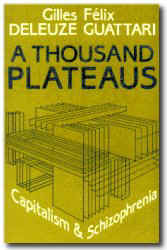 "There's no 'rationalist methodology' in A THOUSAND PLATEAUS. Just an orgy of concepts. Concepts aren't part of logical train of thought in Deleuze and Guattari; they're more like riffs in a guitar piece. Make that a cut of a wild electronica remix!"
"There's no 'rationalist methodology' in A THOUSAND PLATEAUS. Just an orgy of concepts. Concepts aren't part of logical train of thought in Deleuze and Guattari; they're more like riffs in a guitar piece. Make that a cut of a wild electronica remix!"No, Deleuze and Guattari are not members of the band...not exactly. Here's a list of their contributions (to the band and the world) sans rationalist methodology:
idiosynchratic vocabulary pre-conventional world of the unconscious disjointed random multiplicitous Dali-Freud-Kantian parody quasiphilosophy disjointed impenetrable postmodern sentiments
Ok, any questions? All right, let's back it up - beeeep beeeep beeeeep! Over the course of human history (that's right, we're backing it all the way up) the study of philosophy has been an outlet for whiney self-involved weirdos to bitch and moan about the meaning of life, thusly excusing them from manual labor. However, following some hundreds of years of investigation and incremental amassing of knowledge and understanding something happened. We reached a point as humans where we had finally accumulated so much learning that we could draw one conclusion: we ain't got a clue. This is referred to by Charles Young as the crisis of meaning - a psychologically violent moment of thrashing the drawing board clear, leaving behind depths of nothingness. This is kind of a spooky place for the philosophy train to deliver us ("End of the line!") Was it worth it? Have the thousands of years of philosophical tail-chasing all been for naught?
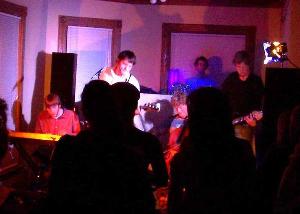
Clearly not, good friends! If nothing else, the progress (or digress) of philosophy has rendered at least one brilliant nugget of shiny goodness - "A Thousand Plateaus." This time I am referring to the band, not the text (referenced at top) from which the band has gleaned its name. Yes, like the text their lyrics are densely idiosychratic and more than a little referrential.
I recently had the opportunity to discuss this issue with a member of the band, Doug (keyboards, pictured). I mentioned to him that I had done a little investigating into the source of the band's new name, discovering that the philosophy text of the same title was regarded with some controversy. To my amusement, most of the reviews of the book were derogatory and undermining, stating it to be, effectively, Mumbo Jumbo. Poppycock. Balderdash. Doug told me that such a reaction made sense coming from 'outsiders' to (as I recall) continental philosophy.
Idiosynchratic vocabulary (read: made-up words, grammar, etc.) and obscured blurry concepts are indeed potential turn-offs for outsiders to philosophy, but what about music? Do approachable lyrics detract from the comment that "A Thousand Plateaus" is trying to make? If so, what exactly is that comment?
Non-sensical jackassery is certainly not it.
April 10, 2006
The Cult of Personality
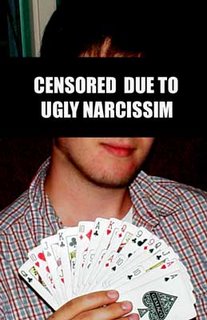 Sigh. MySpace has me. Facebook got me a while ago, so I guess it was just a matter of time. I have to say, though, that I do enjoy looking at pictures of myself. Man, I sure look cool.
Sigh. MySpace has me. Facebook got me a while ago, so I guess it was just a matter of time. I have to say, though, that I do enjoy looking at pictures of myself. Man, I sure look cool.I'm not going to pretend that the previous statements were 100% sarcastic. I'm a pretty self-involved dude, but then again who isn't (I heard a quip recently that America has 280 million special interest groups). Facebook and MySpace are frequently touted as networking agents, places for communication and interaction between socially-minded folks. Ok, that's fine and good, but it seems to me that both are really just a host for a lot of people's shrine to self. I sense that ego stroking and self-validation are cornerstones of this cultural explosion (Look how many friends I have! Look at how many people have viewed my profile! Look at how damn cool I am!).
I'm a little concerned by the texture of the Facebook phenomenon, but mostly I'm just pissed that no one has "poked" me or posted on my wall.
March 16, 2006
My Only Friend, The End

College graduation is approaching, and yet it feels more like doomsday. At the end of a long session in the education game the time has come to cash out the chips, but it's hard to tell if I'm winning or losing. I sense that my shortcomings in academic performance may soon be coming to bear in a very real way, perhaps for the first time. Instead of anticipating the future with a sense of eagerness I feel racked by aprehension, guilt, fear, regret - frozen by the constant psychological torment of self-examination.
I am constantly confronted with the idea of "accomplishment," and I fear that I will never accomplish anything of true validity (graduating from college DOES NOT COUNT). This stems from a realization that my own portfolio of previous accomplishments, once held in high regard by myself, amount to very very little. My understanding of the most basic and unilateral human accomplishment is one of procreation - perpetuating the species. Even (especially?) that task seems to hold little prospect.
 In effect, the model for life presented by the Verve in "Bittersweet Symphony" has occupied my thoughts. The line goes, "You try to make ends meet / You're a slave to money, then you die." At Calvin we are taught the ideology of vocation - serving God's kingdom in our occupation. I'm all about it in theory...on a basic philosophical level this way of thinking is both applicable and beneficial to humanity. However, as well exhibited in my own life, the gap between saying and doing is often of unreachable span. I do believe that I have unique talents and am capable of rendering useful, productive, essential contribution to the world. I now understand that the world is not going to come knocking, requesting and pleading for that contribution. If I want to fulfill a life of accomplishment I must go forth and enact my own path - pushing rather than being pushed. Needless to say, my pushing muscles need some serious toning.
In effect, the model for life presented by the Verve in "Bittersweet Symphony" has occupied my thoughts. The line goes, "You try to make ends meet / You're a slave to money, then you die." At Calvin we are taught the ideology of vocation - serving God's kingdom in our occupation. I'm all about it in theory...on a basic philosophical level this way of thinking is both applicable and beneficial to humanity. However, as well exhibited in my own life, the gap between saying and doing is often of unreachable span. I do believe that I have unique talents and am capable of rendering useful, productive, essential contribution to the world. I now understand that the world is not going to come knocking, requesting and pleading for that contribution. If I want to fulfill a life of accomplishment I must go forth and enact my own path - pushing rather than being pushed. Needless to say, my pushing muscles need some serious toning.P.S. - No more than 10 minutes after first publishing this post I was reading in the coffee shop when "Bittersweet Symphony" played. I am finding such coinciedences to be occurring in increased concentration, and I have begun to think of such incidences more as synchronicity than coincidence. Everything under the sun is in tune?
February 16, 2006
Hooray for Little Feat!

Since the name of the blog reflects my obscure preference for the band Little Feat it seems apropriate to mention that I have been listening to way way way too much as of recent. My two new favorites are "Mercenary Territory" and "Spanish Moon," which incidentally seem to find themselves in close company on all three Little Feat Albums with varying versions (er, two) of those two songs. Five versions of "All That You Dream" and counting....
You Say You Want a Revolution...
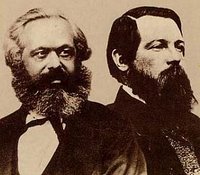 "All fixed, fast-frozen relations, with their train of ancient and venerable prejudices and opinions, are swept away, all new-formed ones become anitquated before they can ossify. All that is solid melts into air, all that is holy is profaned, and man is at last compelled to face with sober senses, his real conditions of life, and his relations with his kind."
"All fixed, fast-frozen relations, with their train of ancient and venerable prejudices and opinions, are swept away, all new-formed ones become anitquated before they can ossify. All that is solid melts into air, all that is holy is profaned, and man is at last compelled to face with sober senses, his real conditions of life, and his relations with his kind."- Marx/Engels
AT LAST COMPELLED TO FACE WITH SOBER SENSES HIS REAL CONDITION IN LIFE...
...but what does that have to do with communism? It is my understanding that Marx was compelled to investigate what he perceived to be a broken socio-economic system (yep, capitalism). He determined that this establishment perpetuated a false consciousness, one which he was able to transcend thus endowing him with special insight into the condition of man.
 To claim that such an awakening can occur in unadulterated isolation from one's own potentially flawed personal motivations and biases may be unduly founded. There seems to exist a limit or selection of introspection which contributes (or initiates) so many accounts of philosophical pontificating. Marx's ideas, not unlike any other, built on existing modes of philosophical thought and applied them to a case-specific social/economic world, the one in which he lived. It is clear to say now, if not then, that certain dimensions of Marx's ideology could be considered obsolete or ill-functional in the contemporary socioeconomic climate - for instance, violent revolution.
To claim that such an awakening can occur in unadulterated isolation from one's own potentially flawed personal motivations and biases may be unduly founded. There seems to exist a limit or selection of introspection which contributes (or initiates) so many accounts of philosophical pontificating. Marx's ideas, not unlike any other, built on existing modes of philosophical thought and applied them to a case-specific social/economic world, the one in which he lived. It is clear to say now, if not then, that certain dimensions of Marx's ideology could be considered obsolete or ill-functional in the contemporary socioeconomic climate - for instance, violent revolution.This is not to say that the thoughts, as a whole, of Marx or any other of his peers in the field of thought, are to be categorically discarded. Yet, the independent functionalism of each case should be examined, placed into contextual perspective, and handled accordingly.
That being said, the life of a radical Marxist revolutionary does have a certain appeal...
February 15, 2006
Here are a couple of prints from my Intaglio Printmaking winter session. This was certainly an interesting course; each day for three weeks I worked in the Calvin print shop from nine o’clock in the morning to four or five in the afternoon. I learned a lot about a variety of techniques and procedures involved with this form of printmaking, and I was also able to produce a good number of different projects.
A few words on the intaglio printing process:
Intaglio printing involves scratching or carving grooves into a flat metal plate (copper in this case). These scratches can be done manually with a sharp stylus, scraper, roller, etc. They can also be achieved by etching. This process involves covering the plate with a thin coating (called ground) and scratching through that to the metal surface. Then the entire plate is placed in an acid bath which reacts to the metal and eats into the surface of the plate.
Once the surface of the plate has been prepared the real fun begins. Each plate’s edges must be beveled by file so that it will not slice through the soft paper when it is pressed. Once the edges are filed the plate is inked over the entire surface and slowly burnished clean with stiff gauze called tarlatan. If wiped properly the unscratched surface of the plate retains only a very thin layer of ink (called plate-tone) while the grooves remain filled with ink. Now the plate is ready to be pressed.
Before the paper can be pressed it must be soaked in a water bath to soften the pulp a bit and allow it to conform to the small grooves in the plate and absorb as much ink as possible. The soaked sheet of paper is blotted or dried between large sheets and a rolling pin. Then the plate is placed face up on the press bed (similar to the one pictured) and the paper is laid on top of that. A layer of dense felt separates the paper/plate from the press’s roller. Once the image has run through the press once it is ready to be pulled or separated from the plate. Now the plate is ready to be re-inked and pressed.
That’s really just the basic overall process; there are a lot of variations and intricacies involved in other aspects of intaglio printmaking. For instance, the blue water in the “Little Glen” print enclosed was achieved by mixing blue ink and a bit of mineral spirits. That solution was then painted on the plate before each pressing in only that specific area after the rest of the plate had been inked in black and wiped clean.
Each of the plates for the prints included in this package was prepared mostly by etching with acid, but they both are augmented by manual scratching (called drypoint).
I hope you all enjoy the prints, even if that means just having them on the fridge with a couple of magnets for a week or two (“Eggs & Bacon” would seem to work well in the kitchen).
January 22, 2006
Untitled (People Print)

Here's another etching, this one is in it's first state. It's basically a cartoon image, which turns out to work really well with the etching and printing process. There was no concept drawing for this print, basically I just started drawing into the ground of the blank plate and it turned into this. Since this stage of the print I've gone back and added a lot more detail - there really isn't any unused space on the plate. I like it.
You don't know...
 This is a very small plate done entirely in drypoint. The image comes from a drawing I did on a scrap from an earlier run of the "Subjugation of Man" print. It's basically a single contour line drawing of a face with some additionally built-up areas. In some of the down time from the etching process for other plates I was able to complete a whole edition of this print, which includes the very cool red-ink "background." This was achieved by a technique called surface rolling where the plate is inked and wiped normally, but before it is pressed another layer/color of ink is rolled onto the surface of the plate, leaving the darker ink in the grooves. I really like the way it looks.
This is a very small plate done entirely in drypoint. The image comes from a drawing I did on a scrap from an earlier run of the "Subjugation of Man" print. It's basically a single contour line drawing of a face with some additionally built-up areas. In some of the down time from the etching process for other plates I was able to complete a whole edition of this print, which includes the very cool red-ink "background." This was achieved by a technique called surface rolling where the plate is inked and wiped normally, but before it is pressed another layer/color of ink is rolled onto the surface of the plate, leaving the darker ink in the grooves. I really like the way it looks.
Eggs & Bacon

This print is for the portfolio exchange project at the end of class. The assignment was "Food," and the new cast-iron skillet had to be featured. This image consists of mostly etched lines, those in the stove and fridge are the boldest since they were left in the acid for a longer time than the background lines. The tonal area on the fridge was achieved by a process called aquatint in which a thin coat of spraypaint or resin is applied to the plate and allowed to etch (in that specific area) for a brief time. The result is a spray-paint like tone, very different from the look of built up hatch marks (such as in the carpet area). The only drypoint (manually scratched) technique on the plate was with a roulette in the floor of the kitchen. A roulette is basically a roller which leaves a uniform swath of dots where it is pressed into the plate. I chose to leave some of the incidental scratches from the etching process, I think they represent the grubbiness of the apartment and assist the image of the dartboard and street sign in adding context to the overall image.
January 17, 2006
Dream Deferred
What happens to a dream deferred?
Does it dry up
like a raisin in the sun?
Or fester like a sore --
And then run?
Does it stink like rotten meat?
Or crust and sugar over --
like a syrupy sweet?
Maybe it just sags
like a heavy load.
Or does it explode?
This one officially gets my "Good Poem" stamp of approval, comparable to the Pulitzer I would imagine. My question, though, is what happens when there is no dream at all?
January 16, 2006
Intaglio Printmaking Class
[Click on image for hi-res version]

This print is an etching done with hard ground on a copper plate. Although the plate is in its final state, the print is only a proof, as evidenced by the blotches of unwiped ink in some areas. One of the most challenging aspects of intaglio printmaking is wiping the surface of the plate consistently without removing too much of the grooved ink, resulting in a weak, dim image. This task becomes even more difficult in the presence of much fine detail on the plate (clever me).
The assignment for the class was "Historical Event." I decided on a symbolic, post-fact depiction of the fall of humanity centralizing on the withered carcass of the Tree of Knowledge of Good and Evil. The human element in the image is portrayed in the form of an ancient statue which has been enshrined and nearly overtaken by the grasping root structure of the ancient tree. One of the statue's hands reaches out for the illusory fruit, perpetually out of reach. The shadow or influence of the snake is still palpable, despite the aparent expanse of time which has passed since the actual event.
"A little knowledge is a dangerous thing."
- Conventional Wisdom